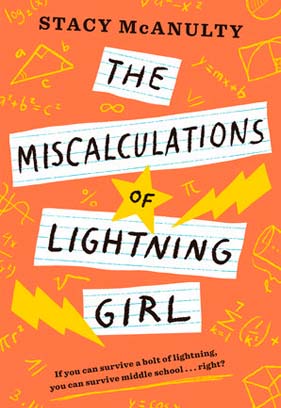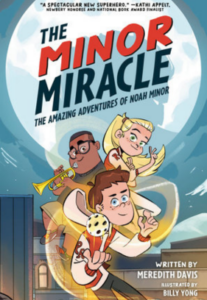Lucy was only 8 when she was hit by lightning. She was out playing with a friend as a thunderstorm blew in. And just as she was climbing over a chain-link fence to head home, lightning struck the fence and sent her flying. She was actually dead for a little while, until someone used something called a defibrillator to zap her heart back into action again. And along with some bruises and burns, young Lucille Fanny Callahan woke up with something like a hole burned into her memory.
Oh, and she was suddenly a math genius, too. The doctors called it an “acquired savant syndrome.” Her uncle Paul calls it a superpower. Lucy sorta likes that one better.
Wanna know the square root of 1,236,089? Lucy can tell you without even thinking. (It’s 1111.79539485, by the way.) You want to know the numerical value of pi (π)? Lucy can rattle that off to the 314th decimal point in her sleep.
But that’s kinda the problem, too.
While Lucy now has a mathematic superpower, that lightning strike also left her with some odd tics. If she gets just a little bit upset or out of sorts, the numerical value of pi starts whizzing through her brain. The only way she can keep it in check, the only way she can keep control, is by repeating certain patterns.
So, when Lucy sits down in a chair, she doesn’t just sit like you or me. She sits. Then stands. Then sits. Then stands again. Then finally sits and stays seated. She can’t help it. It’s just what she has to do.
If an adult sees her going through these kinds of repetitive rituals, they might frown or shake their head or think, “Odd kid.” They’re usually polite about it. But fellow middle graders? Not so much. If someone her age sees her, they zone in on Lucy like there’s a sign on her back that reads: “Please Torment This Weirdo!”
Now, that hasn’t been a huge problem over the last couple years, since Lucy has been home-schooled by her grandmother, Nana. The only people she ever really interacted with were usually on some math site or calculus-focused forum. And they never see her. They just thought she’s cool because she’s so great at math. But that’s all about to change because Nana has decided that it’s time for Lucy to get back to school and start being with kids her own age.
Lucy was thinking she might study at some college, since she’s been taking college-level math classes already anyway. But Nana is adamant. A 12-year-old girl should be able to make friends with other 12-year-olds, as far as Nana is concerned. And Nana has her ways of getting her way.
Lucy hates the idea, but she and Nana make a deal: “Lucy will go to middle school for 1 year. Make 1 friend. Join 1 activity. And read 1 book (that’s not a math textbook).” Lucy isn’t sure what a girl with a super-brain, who does calculus homework for fun, can possibly learn in the 7th grade. But a deal is a deal. And it shouldn’t be that hard.
So why does she feel like this might be an equation that she won’t be able to work out?











